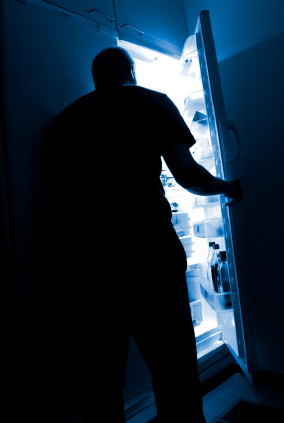By Bob Greene for TheBestLife.com
When is a calorie not a calorie? Many experts argue whether you eat 300 calories in the morning or in the evening, it’s still 300 calories. This may be true in a physiological sense, but as you are no doubt aware, losing weight is about more than just calories in and calories out.
In my experience helping people lose weight, I’ve seen first-hand how dangerous nighttime calories can be. That’s why one of my Best Life guidelines (one that I’m a stickler about) is to stop eating at least two hours before bed. Here’s why I’m a strong supporter of a nighttime eating cutoff:
1. You miss the opportunity to burn off extra calories at night. If you overeat during the day, you have a chance to be more active in the ensuing hours (when you’re more likely to have the energy to do it) and burn off those extra calories. At night, as your body prepares for sleep, you don’t get this chance.
2. Evening hours are a danger zone for dieters. A lot of mindless eating happens at night. In front of the TV, after a long, stressful day at work, many of us just want to check out as we fill up. That’s a sure-fire recipe for disaster. One of our bloggers struggled with this problem, until she tried the eating cutoff.
3. Nighttime nibbles come at a high calorie cost. When you’re hungry and tired, what are you more likely to do: Reach for a big of chips or whip up a healthy salad?
4. A full stomach can interfere with sleep. As I’ve reported before, adequate sleep is essential for weight loss and good health. Having a bite before bed can prevent you from getting a good night’s rest. If you have reflux, you may find that following the eating cutoff helps alleviate some of your symptoms.
5. Overdo it at night, and you may not wake up hungry. What’s so bad about that? It could cause you to skip breakfast. Starting your day off with a morning meal is another Best Life guideline. Research shows that people who eat breakfast every day are slimmer than those who skip it. You should go to bed feeling just slightly hungry—that’s a sign that you’re doing things right! This primes you to wake up hungry and ready for a nutritious breakfast. (For quick and healthy breakfast ideas, click here.)
If you’re used to eating at night, it could be a hard habit to break. A couple of helpful hints: Make sure you’re eating enough during the day so you don’t feel ravenous at night. Also, come up with a list of other things you can do during those dangerous evening hours; read a good book, organize your closet, catch up with a friend, give yourself a facial or pedicure. After all, when you’ve managed to eat healthfully all day long, you don’t want to undo all that good work an hour or so before you go to bed.
Also Read:
9 Good-for-You Goodies Worth the Indulgence
The Healthy Fix for Lunch’s Middle Child Syndrome
5 Strategies for Beating Mindless Eating
